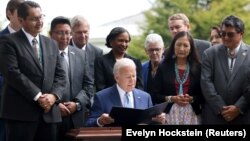On the second Monday of October, many in the United States commemorate the voyage of discovery by Europeans to the Americas and the man who led it, Christopher Columbus. On October 12, 1492, the three ships under his command landed in today’s Bahamas archipelago and claimed the land for Spain.
The purpose of the voyage was to find a shorter, safer route to the Far East, thus eliminating the long trip around Africa. Such a shortcut would be of immense economic value to the Spanish crown, which financed what proved to be the most daring and momentous voyage in history.
But although he undertook his voyage on behalf of Spain, Columbus himself was an Italian navigator from Genoa, and for that reason, Columbus Day came to be recognized as a celebration of people of Italian descent and their accomplishments.
But not everyone was happy to celebrate Columbus and his voyage of discovery, as it was quickly followed by an influx of European conquerors and colonizers, and that spelled disaster for the native populations. Columbus, his men, and many of those who followed in their footsteps were brutal to the local populations, enslaving and exploiting them, and unknowingly infecting them with European diseases for which they had no immunity. That pattern repeated itself elsewhere as Europeans settled in the Americas.
So, while today many people, particularly those of Italian descent, celebrate Columbus Day on that second Monday in October, 26 States and numerous cities and organizations around the country hold a counter-celebration: Indigenous Peoples’ Day.
This dichotomy reaches all the way to the White House. Last year, President Joe Biden issued two holiday proclamations. The first one was for Columbus Day, in which he noted that “[Columbus’s] voyage inspired many others to follow and ultimately contributed to the founding of America, which has been a beacon for immigrants across the world.”
The second stated that “On Indigenous Peoples’ Day, we honor the sovereignty, resilience, and immense contributions that Native Americans have made to the world.”
On Indigenous People’s Day, we recognize that some of those who call themselves Americans are descendants of peoples who have lived on this continent for thousands of years. Others have come, or are descended from those who came, from many cultures and from all over the world, seeking a better life. And all of them contributed to who we are today.














